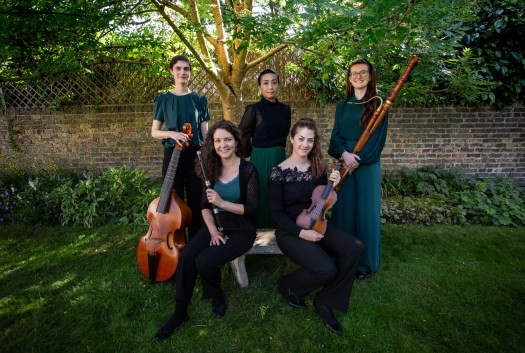
York Early Music Festival: Helen Charlston & Toby Carr, Undercroft, Merchant Adventurers’ Hall, York, July 10; The Marian Consort & Rose Consort of Viols, National Centre for Early Music, York, July 11
THERE is something special about a late-night recital, especially when the lights are low. The low-ceilinged Undercroft, with the audience in darkness and the performers dimly back-lit, was just the ticket for a spot of drama.
With the trusty theorbo of Toby Carr for support, Helen Charlston brought her considerable voice to bear on battle-hardened heroines.
Hers is no ordinary mezzo, as in soprano without the high notes. She has a considerable range, both high and low, but her tone is smoothly focused throughout, without sign of gear changing. Add to that a flair for diction which adds conviction to her theatricality, and you have a voice like no other. This was an exciting evening.
She opened and closed with Purcell. His most successful song in Bonduca (Boadicea as imagined by John Fletcher), O Lead Me To Some Peaceful Gloom, neatly captured the heroine’s inner conflict, and An Evening Hymn spoke of bold spiritual confidence.
She also evinced a special feel for the music of17th-century Italian Barbara Strozzi, a singer herself. The bitter-sweet pain of L’Heraclito Amoroso and the marvellously Italianate decorations in La Travagliata (The Tormented Woman) were meat and drink to Charlston’s skill.
She took her programme title, Battle Cry, from an eponymous work by Owain Park setting poetry by Georgia Way, which she premiered in 2021. It pictures intimate reactions to four ‘abandoned’ women: a lament for Boadicea, the solitude of Philomela, a prayer to Sappho and love-regret for Marietta.
Here she showed an uncommon affinity for the words, in vocal lines that were grateful even when occasionally flowery. Carr’s underpinnings were invaluable; as so often elsewhere, his rhythmic awareness added colour to the ebb and flow of passion. Its harmonies were modern but its aura evoked a much earlier era.
The highlight of the programme was the nobility in Charlston’s approach to Monteverdi’s Lamento d’Arianna, which allowed us to discern a steely centre to the heroine’s emotional roller-coaster. Her dramatic style suggested that she must soon have a future on the operatic stage.
Carr was with her every step of the way. Indeed, it would have been good to hear more from him alone than the three brief solos we were allowed. Either way, they made a powerful duo.

THE following lunchtime saw the combination of two consorts, the Rose Consort of Viols, which harks back to this festival’s origins, and the Marian Consort (of six voices). Byrd At Elizabeth’s Court celebrated the great man’s high-wire act as a Roman Catholic under a Protestant ruler.
It also allowed anthems normally heard with organ accompaniment to be experienced with the intimate richness of viols.
At its heart lay Byrd’s carol anthem Lullaby, My Sweet Little Baby, which features the Virgin Mary’s gentle retort to the Massacre of the Innocents.
Responding to a new commission from the consorts to commemorate the 400th anniversary of Byrd’s death, Juta Pranulytė sensitively chose the same text to reflect the number of children born into war, cruelty and oppression in our own day.
Pranulytė’s smooth vocal lines moved in mainly close harmony over viols required at times to produce trills and portamentos. The soprano opened at the top of her range and needed to negotiate several high semi-tonal shifts.
The atmosphere thus conjured was elegiac, combining comfort with tears, in a style reminiscent of Byrd’s own musical misgivings about the plight of Roman Catholics under Elizabeth. Apart from its prologue, which was diffuse, this was a canny piece of writing that fell easily on the ear.
Several verse anthems surrounded this centrepiece. The higher-voiced soloists mainly needed to enunciate more clearly, but choral blend was exquisite. Byrd’s rare setting of Italian, the Ariosto poem La Verginella, was delicately treated by the soprano Caroline Halls.
Other highlights included the madrigal-style Come To Me Grief, For Ever, sung unaccompanied, and a gorgeous Amen to close the New Year carol O God That Guides The Cheerful Sun. The Tallis motet O Sacrum Convivium, sung from the back of the hall, was an apt reminder of Byrd’s important mentor and (later) close colleague.
The Roses offered several pieces on their own, including a five-part Tallis fantasia reconstructed by John Milsom and Byrd’s voluntary for Lady Nevell, infused with snappy figurations. His variation-packed Browning was typical of the ensemble’s smooth dexterity.
Review by Martin Dreyer

























